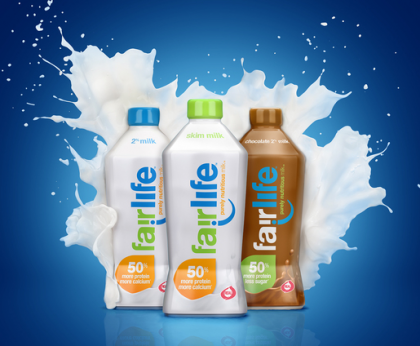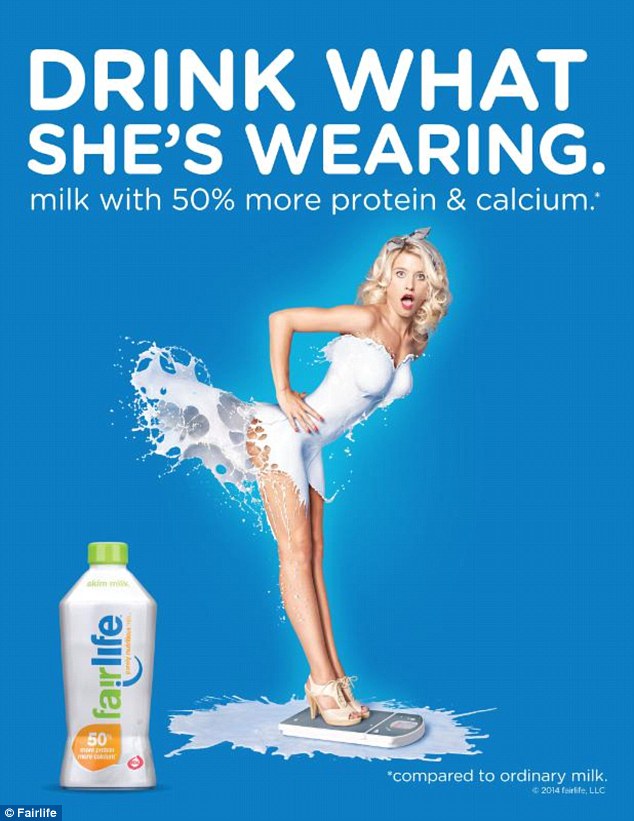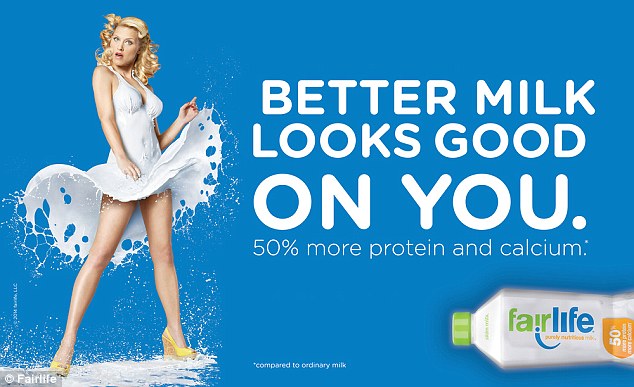It recently came to my attention through a Facebook post that Coca-Cola is coming out with a new brand and a new product: fairlife milk. The Facebook post linked to a Mic article talking about things such as how the production process, while toting itself to be completely open, is actually quite secret. The video that they use to explain the process to consumers is basically written for a five-year-old’s comprehension level, and the anthropomorphized fat molecule in the video itself is a bit grotesque, as if to still tell viewers that fat is bad. What makes fairlife milk stand out from all the others that are already on the market, however, is that it has 50% more protein and calcium and 30% less sugar compared to regular milk as well as no lactose. The three available choices are 2%, skim, and chocolate. While the company wants you to think that this is exciting and revolutionary, their original ad campaign will tell you otherwise.

The culprits. Picture courtesy of fairlife.
Instead of having the mysteries of fairlife grab my attention, what really caught my eye was the banner image for the article. I have a slow thought process, so instead of immediately feeling anger I decided to ask others on Facebook, “How do you guys feel about the advertising that this product is using? The whole conventionally attractive, ‘perfectly-proportioned’ women in liquid dresses and high heels is kind of turning me off. I know that they are trying to imitate famous pictures [looking back lovingly on the pin-up girls of the 1900s] but at the same time feel that it was done in poor taste.” Admittedly, I didn’t know much about it and wanted to look into the ad campaign before saying more.

My favorite – the woman on a scale. Picture courtesy of dailymail.co.uk
However, I did not like what I found. There were more than four images that featured this sort of work, and I found that many people had already called out the brand on its sexist, objectifying and demeaning advertising. You’ve heard it all before, you’ve heard about it many times: sexualizing and objectifying women to sell a product is nothing new. Ads should be creative; if it is going to be something that attracts customers for their money, there at least should be more to it than just revamping an old sexist pop culture reference, right? That’s just plain lazy, if anything. The scantily clad, awkwardly positioned women with their clearly defined breast lines were obviously posed for the gratification of the male gaze, and that was what irked me the most. If this was some sort of pro-body/body love movement, I would be all for that, but this branding perpetuates the culture that we are trying to get rid of. This is the culture that has caused countless girls and women to become anorexic and bulimic as well as develop health and body image disorders. Women end up hating their bodies, and this advertising only feeds these feelings as opposed to telling us that it’s okay to not be a certain “ideal.” Show women of different body types, show women of color, show women of different gender, women with piercings and tattoos, young and old, because those are the women who make up the demographic that you’re trying to sell to, fairlife. Stop showing us what you consider ideal, and what we have come to believe is ideal: these Photoshopped, skinny yet big-breasted, light-skinned women.
According to Wikipedia, a pin-up girl is a model whose mass-produced pictures see wide appeal for popular culture. This doesn’t have to go away, but what we conventionally think of pin-up girls should. A new pin-up girl must come about : one who represents real women as opposed to these insanely sexualized ones with unattainable bodies. Pin-up girls can keep their sex appeal and help rid women of body shame. However, they cannot remain as impossibly figured women, otherwise it will help continue the body shame for girls and women who are overweight, who have small breasts, who think they are oddly-shaped or ugly, etc.

What are they trying to tell (sell) us? – Picture courtesy of dailymail.co.uk
Thankfully, the advertisements have been dropped, presumably because of the negative attention it received online. What especially bugged me was that fairlife and Coca-Cola did not own up to what they had done. There was no apology, no small acknowledgement that they made a mistake and were sorry for it. In this page about the ads, their exact words for not continuing the pin-up campaign are: “The feedback that we received from the good folks in Minneapolis and Denver was that while they l-o-v-e-d the milk, some people loved the pinup campaign, and others didn’t… So we’ve moved on, and going forward, we’ve got other cool advertisements coming your way!” This honestly sounds so hollow, overly optimistic, saccharine, oblivious and cheesy that it does much to belittle the fact that they perpetuated the sexualization of women’s bodies.

